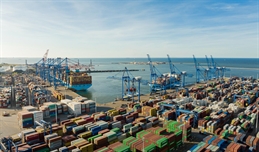
PSA International's Baltic Hub (formerly known as DCT Gdańsk), the operator of the largest container terminal in the Baltic Sea, has kicked off construction of its third deep-water Terminal - T3.
When fully completed in the second quarter of 2025, the new terminal will have a 717-meter-long and 17.5-meter-deep quay wall and will be Baltic Hub's third deepsea berth that can handle the largest container vessels in the world.
In a statement, Baltic Hub said the new terminal will also provide 36.5 hectares of additional operating space.
In total, the investment is worth €450 million (US$474 million).
"The T3 project, which will be open for commercial operations after the first phase is completed in the first half of 2024, is a testament to Baltic Hub's ambition to develop the largest container hub to serve Central and Eastern Europe as well as the Baltics and become one of the largest container terminal hubs in Europe," the terminal operator said.
The construction of the T3 project will be executed in two phases.
In the first phase, the consortium of the companies Budimex and DEME will build the 36-hectare terminal area next to Terminal 1, which will be completed by the first half of 2024, and will be entirely reclaimed from the sea.
This will increase the handling capacity of the Baltic Hub by 1.5 million TEUs (20-foot containers) to 4.5 million TEUs per year.
In the second phase construction of the 717-meter-long, 17.5-meter-deep quay wall will commence. This is scheduled to start in early 2023 and be completed in the second quarter of 2025.
Baltic Hub said the T3 project also involves the purchase of seven quay cranes that are capable of handling the world's largest vessels, as well as 20 semi-automated Rail Mounted Gantry (RMG) cranes for the container yard, which operators will be able to control remotely from ergonomically-designed workspaces.
Baltic Hub with two deepsea quays handles more than 2.09 million TEUs in 2021 with a total annual capacity of up to 3 million TEUs.
"Just 10 years ago, Poland was not a significant player in container handling," said Marek Gróbarczyk, secretary of state in the ministry of infrastructure, Government Plenipotentiary for Maritime Economy. "Today, we are starting a historic investment - the largest container port."
Gróbarczyk noted that Baltic Hub has also become a transport gateway to Central and Eastern Europe, with inland destinations such as the Czech Republic, Slovakia, Hungary and Germany.
"This is a result of continuous investments over the years, that elevated its rail capacity to 750,000 TEUs in 2020."
Baltic Hub CEO Charles Baker said the T3 development will bring the latest low-carbon technology which any European port would be proud of.
"We emphasize once again that we are taking internationally recognized precautionary measures to protect the environment, marine life and habitats in the project area. This construction from A to Z will reflect our commitment to sustainable investments," Baker said.
"T3 will further enrich the services that Baltic Hub offers. Moreover, we will be able to attract new services, destinations and shipping alliances. By developing additional transhipment capacity and opening up new sea connections, we will also provide a boost to the Polish economy as a whole."
Baltic Hub started operations in 2007 under the name of DCT Gdansk and has a handling capacity of up to 3 million TEUs per year. The total length of the terminal's two deepwater berths is 1.3km enabling it to handle 4 vessels simultaneously.
The terminal serves more than 700 vessels per year, including 100 calls of the world's largest container ships.
In 2021 terminal handled over 2.09 million TEUs. On April 8, 2021, BH reached the 15 million TEU milestone, the total throughput handled since the terminal's establishment.
BH is owned by PSA International (40%), Polish Development Fund (30%) and IFM Global Infrastructure Fund advised by IFM Investors (30%).



